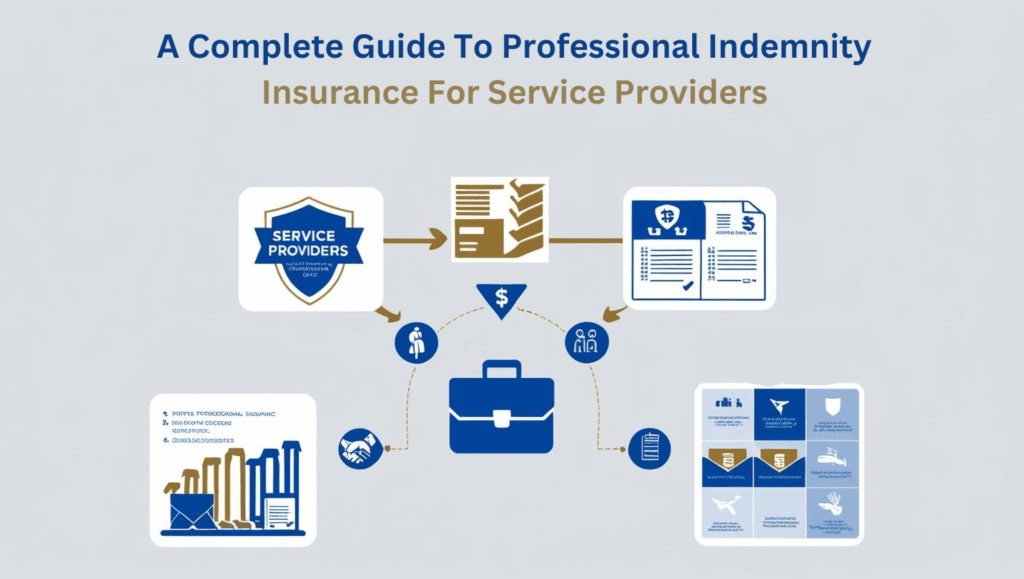Whether you are a seasoned professional or a top business owner, no matter how smart you are, it’s very human to make mistakes. There is always some risk with consulting and providing services but if it causes a financial or legal problem to your clients, what will you do? Dealing with a lawsuit or claim is never easy. It can put you under severe financial strain, there can be a loss of credibility and might even end up shutting your business. Professional Indemnity Insurance (PII) will protect you when things go out of control.
Table of Contents
ToggleWhat Is Professional Indemnity Insurance?
Let’s start with the basics of the concept. In simple words, even if you make a mistake, your business can continue to operate and you won’t have to face any financial troubles. If your client claims to suffer a financial loss or any other damage because of you, PII will support you throughout the situation. It could be an honest mistake but since it has impacted the client, you will have to pay for that. Thankfully, this insurance will cover the legal fees and other settlement costs that will be needed.
Why Do You Need It?
It takes only a small mistake to get slapped with lawsuits, lose a lot of money and ruin the entire reputation that you built over the years. If you are a service provider, you must have a PII. Here’s why:
- Mistakes Happen: It’s human to make mistakes. Even an accidental oversight in a report or calculation can lead to claims. This insurance won’t let your business be at risk because of a single error.
- Part of The Contracts: Some clients specifically ask you to have a PII to work with them and it also reflects your professionalism. Your potential clients can see that you take all responsibility for the work very seriously and are well-prepared for any situation.
- Reputation Protection: Legal actions can blemish a business’s image. If you have PII, your issues will be resolved quickly with the least damage. You will come across as more credible and committed to high standards of service. Hence, the clients will trust you more.
- Financial Security: It’s neither easy nor affordable to fight legal battles. Even minor claims can cost you a lot. But PII ensures you are not financially hit. With this insurance, you won’t have to pay the fee or compensation out of pocket.
What Does It Cover?
Professional Indemnity Insurance typically covers a bunch of situations that can cause you serious troubles:
- Negligence: It will save you if you fail to meet the expected level of care at work. Example, an accountant miscalculates tax liabilities leading to financial penalties for the client.
- Breach of Duty: If there has been a compromise with the confidentiality of the client or intellectual property like a consultant accidentally leaking sensitive client data. Such lawsuits will be managed.
- Defamation: Let’s say you caused unintentional harm to someone’s reputation like publishing incorrect information about a client, you could face legal action but PII will handle it.
- Errors or Omissions: If your mistakes made the client suffer financial losses, it will be settled through the insurance. Example, your marketing agency gave incorrect product details and now the client is losing sales.
- Legal Costs: Even if the claim is baseless or you are not guilty, you still have to defend yourself in court and this is an expense. PII will cover lawyer fees and court expenses that have been incurred in the process.
- Settlements: In case you are found guilty, you would have to settle with compensation to the clients. It can range from a few thousand to millions but thankfully, it’s insured.
However, you must remember that PII only covers honest mistakes and unwillful actions. If, upon searching, any evidence of fraud or intentional misconduct, is found, there will be no PII help.
Who Needs Professional Indemnity Insurance?
If it’s in the nature of your work to impact clients financially or handle sensitive information, considering PII is a must. With this, you can confidently provide services without the fear of facing legal repercussions. It’s extremely important for:
- Consultants and Advisors: One wrong piece of advice and your clients could face financial consequences. Suppose a financial consultant recommends an investment that leads to losses for the client.
- Medical Professionals: You can always expect legal action against you if patients feel mistreated. Poor diagnosis or prescription errors would wreak havoc on you.
- Legal Professionals: Inaccuracy in documents or errors in representation can be a costly situation. If a lawyer misses the deadline or a hearing, the client will face losses.
- Architects and Engineers: Of course, any mistake in design or calculations will be a disaster. A miscalculation will ruin the structure and will cause property damages and lawsuits.
How to Choose the Right PII Policy?
Picking the right policy is very important and it’s also easy if you consider these points:
- Know Your Risks: Each industry has unique risks associated. Make sure all the risks of your profession are covered.
- Coverage Limits: Be sure that your policy can handle even worst-case scenarios and you can get the maximum claim amount.
- Industry Needs: Besides the basics, the policy must also provide additional protection against specific industry-related situations.
- Ease of Claims: Always select an insurer that processes claims without any hassles. They must have a good reputation for quick service. Check reviews and testimonials before finalizing.
- Balance Cost and Coverage: Cheaper policies often offer limited coverage. Be safe and compare premiums to the potential financial impact of a certain legal action.
When Should You Get PII?
Honestly, immediately! It’s normally suggested to have a policy in hand even before you start offering services or signing contracts. If you wait too long, you are at a higher risk of being exposed to unnecessary troubles. A lot of PII policies only cover claims filed while the policy is active. In case you cancel your coverage and then make a claim, it won’t be covered, even if it’s for the work that’s already been done.
Conclusion
Providing professional services requires you to be very responsible and ready for the risks. Look at Professional Indemnity Insurance as a smart investment that will be a strong shield for your business and image and will give you peace of mind as well. It will help your business thrive even in the face of challenges. Show your clients that you’re reliable, only do the right thing, and win their confidence.








